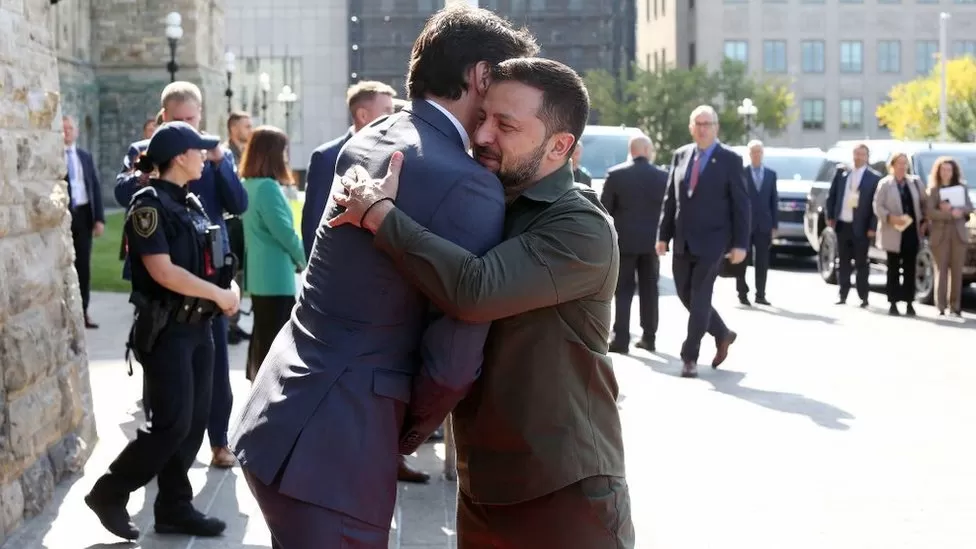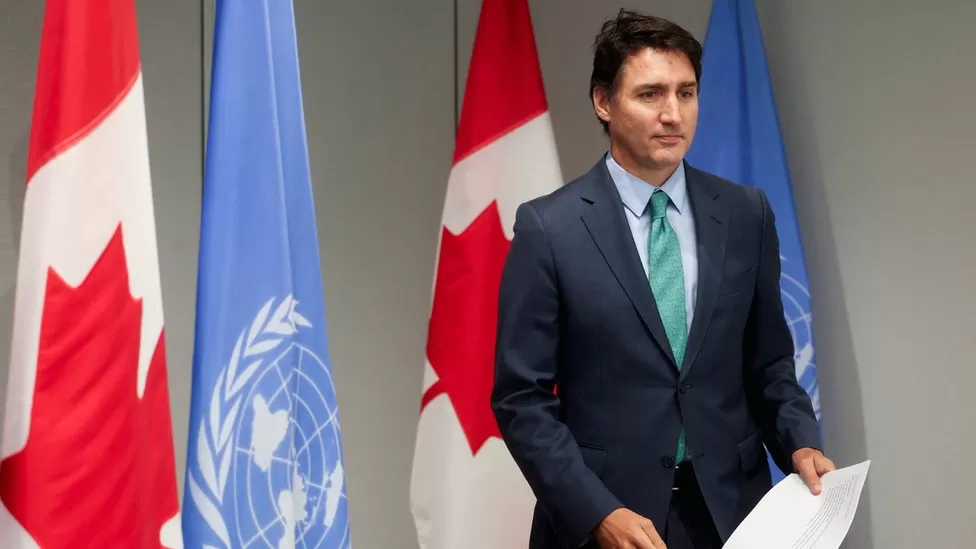This week in New York, when reporters asked Canadian Prime Minister Justin Trudeau questions, his usual smile started to disappear.
This week in New York, when reporters asked Canadian Prime Minister Justin Trudeau questions, most of them were about India. Earlier, Mr. Trudeau had said something surprising: he believed there was strong proof that the Indian government was involved in the unlawful killing of a Canadian citizen in Canada. This person was a Sikh activist, and India accused him of being a terrorist.
The government in Delhi said it had nothing to do with the murder.
Mr. Trudeau spoke slowly and carefully, sticking to his main points. He said, “We’re not trying to make trouble. We’re just standing up for what’s right.”
But some reporters wondered where Canada’s friends were. One journalist told Mr. Trudeau, “So far, it seems like you’re alone.”
At least in the public’s view, Mr. Trudeau seemed to be facing India mostly by himself. India is one of the world’s fastest-growing economies and has a population 35 times larger than Canada’s.
Since the prime minister made his big announcement, his allies in the Five Eyes intelligence group have made somewhat similar statements, but none have given strong support.
The UK Foreign Secretary, James Cleverly, said they were taking Canada’s concerns very seriously. Australia said they were “deeply worried” about the accusations, using almost the same words.
But the US, which is very close to Canada, didn’t loudly support Canada. When President Joe Biden talked about India this week at the UN, he didn’t criticize but praised India for helping with a new economic plan.
Later, Mr. Biden’s National Security Adviser, Jake Sullivan, said there wasn’t a big problem between the US and Canada and that Canada was being talked to a lot. But other public statements were not very strong, mostly just expressing concern and saying how important India is to the Western world.
According to experts who talked to the BBC, Canada is in a tough spot because, right now, India’s importance in global strategy is much bigger than Canada’s. They see India as a key player in balancing out China’s power.
Xavier Delgado, a researcher, said, “The fact that they haven’t come out and rushed to Canada’s defense is indicative of the geopolitical reality.”

The US Ambassador to Canada, David Cohen, confirmed that the Five Eyes partners had shared information about this. But he didn’t comment on private conversations about Canada asking for public condemnation of the murder.
This situation might also show that while Canada is a reliable friend in the Western world, it’s not a really big global power on its own.
Christopher Sands, from the Canada Institute, said, “This is a moment of weakness. Right now we’re seeing a hard power moment. That is not the environment where Canada shines. The decisive stuff is all force, power and money, which Canada doesn’t have.”
Most people outside India didn’t have a problem with Mr. Trudeau sharing these allegations publicly. If they’re true, it would mean a political killing in Canada by a fellow democratic country. But even though it’s a big ethical issue, it might not be enough to change the global situation.
For Mr. Trudeau, this means he spent a few days feeling quite alone as tensions with India got worse and worse. There were diplomatic issues, warnings about travel, and, most drastically, a stop to visa services for Canadians who wanted to go to India.
To make things worse, this tough week came after a very long summer for Canada’s Liberal leader.
While Canadians were struggling with prices going up and high interest rates, there was news that China might have tried to interfere in Canadian elections. Some people said Mr. Trudeau and his team knew about it but didn’t take it seriously enough.
Then, they found out that a very well-known serial killer, Paul Bernardo, was being moved to a prison that’s not the highest security. This made a lot of people across the country very angry. Once again, Mr. Trudeau’s team got criticized for not being prepared.
By September, the number of people who approved of Mr. Trudeau was the lowest it had been in three years. About 63% of Canadians didn’t think he was doing a good job, even though he was elected in 2015.
Shachi Kurl, who works at a research group, said, “In eight years, he’s never been this low.” People were asking him directly, “Are you going to stay in your job? Will you quit?”
For Mr. Trudeau, this is another tough reality. He started as a somewhat famous person in Canada’s top job and had a lot of support.
“He’s a big name like we’ve never had in Canadian politics,” said Campbell Clark, who writes about politics for the Globe and Mail newspaper. “After he won the election, people really liked him.”
But after eight years of being a very visible prime minister, maybe Canadians have had enough. Mr. Clark thinks it seems like Mr. Trudeau’s popularity has gone down, especially in recent months.
However, some people who know a lot about this situation said that even though it might seem like Mr. Trudeau is by himself on the world stage, this argument with India could actually help him back home.
“It took him away from all of these questions about Canada,” Mr. Clark said.
And it probably didn’t hurt that Mr. Trudeau ended his week standing next to another friend, who is an even bigger famous person – Ukrainian President Volodymyr Zelensky. For at least one day, Mr. Trudeau looked like he was in very good company.
SOURCE: BBC

